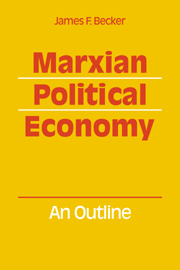Book contents
- Frontmatter
- Contents
- Acknowledgments
- Introduction
- PART ONE THE REPRODUCTION SCHEMES
- PART TWO THE LABOR THEORY OF VALUE
- PART THREE RELATIONSHIPS BETWEEN PRICES AND VALUES
- PART FOUR THE DEVELOPMENT OF CLASS STRUCTURE AND RELATIONSHIPS
- 10 Class structure and conflict in the managerial phase I
- 11 Class structure and conflict in the managerial phase II
- 12 Rotational employment and the transition to socialism
- Notes
- Index
11 - Class structure and conflict in the managerial phase II
Published online by Cambridge University Press: 07 October 2011
- Frontmatter
- Contents
- Acknowledgments
- Introduction
- PART ONE THE REPRODUCTION SCHEMES
- PART TWO THE LABOR THEORY OF VALUE
- PART THREE RELATIONSHIPS BETWEEN PRICES AND VALUES
- PART FOUR THE DEVELOPMENT OF CLASS STRUCTURE AND RELATIONSHIPS
- 10 Class structure and conflict in the managerial phase I
- 11 Class structure and conflict in the managerial phase II
- 12 Rotational employment and the transition to socialism
- Notes
- Index
Summary
The dual accumulation and breakup of the middle class
Within the countries of the advanced capitalism – elsewhere the vitality may be greater – the mode of production is reaching the outer limits of its development. Industrial accumulation is slackened, weighed down by the burdens of circulation. Within the dual accumulation of unproductive and of productive labor, of circulatory and of industrial capitals, the productive forces are seriously weakened. The struggle between capital and labor intensifies, and this is seen not only in relations between capital and the industrial working class but within the so-called middle classes, where there is a sharpened tension between the managers, as executives of the ruling class, and the branch of the working class over which it rules directly, administrative labor.
The split between the managers and administrative labor divides white-collar labor into economically and politically opposed divisions in an ineradicable and growing schism whose depths we have yet to plumb. While we come immediately to this task, let us say first that this conflict between administrative labor and the managers is merely a part of the broad struggle between capital and labor. It, too, traces to the accumulation of capital, to old drives that are still powerful but working in an ever more eccentric manner. With the incidence of science and invention upon techniques of administrative utility – use values inherently serviceable for the coordination of social activities – the great accumulators have promoted the administrative capitals with mounting enthusiasm at the outset and with mounting desperation with the passage of time.
- Type
- Chapter
- Information
- Marxian Political EconomyAn outline, pp. 245 - 262Publisher: Cambridge University PressPrint publication year: 1977



